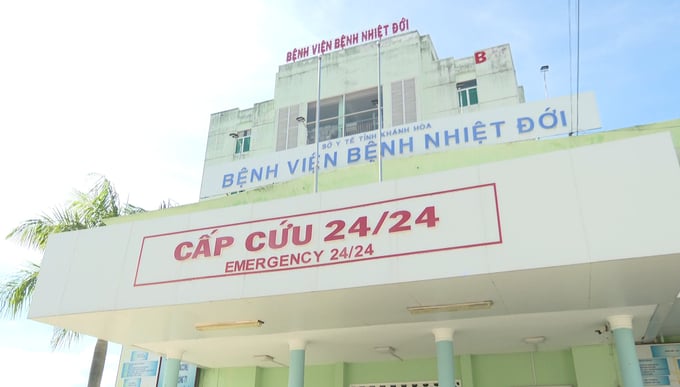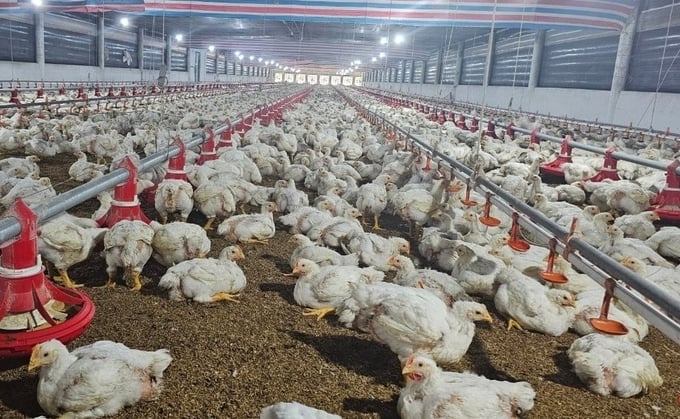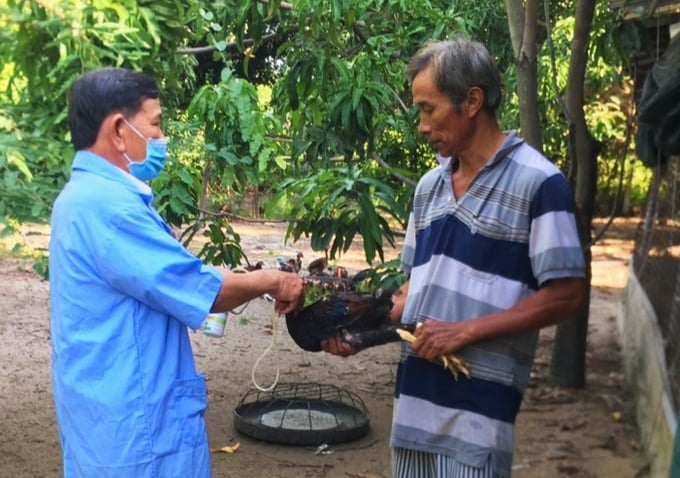May 30, 2025 | 12:33 GMT +7
May 30, 2025 | 12:33 GMT +7
Hotline: 0913.378.918
May 30, 2025 | 12:33 GMT +7
Hotline: 0913.378.918

The local government is unable to determine the source of the lethal A/H5 avian influenza transmission to humans in Khanh Hoa province. Photo: KS.
The findings of an investigation into the A/H5 avian influenza outbreak in Tan Ninh hamlet, Ninh Trung commune, Ninh Hoa town, Khanh Hoa province—where one human illness was reported—were recently released by the Regional Animal Health Office No. 4.
The province's Sub-Department of Livestock Production and Animal Health conducted an epidemiological investigation on March 21. Accordingly, two samples were collected from the patient's poultry flock, and one sample was collected from the patient's neighbor's chicken flock in Tan Ninh hamlet, Ninh Trung commune.
In addition, the Sub-Department collected two samples from a pet bird shop located near Nha Trang University in Vinh Tho ward, where the patient is temporarily residing.
Subsequently, the samples were sent to the Regional Animal Health Office No. 4 for testing for the A/H5 avian influenza virus; subtypes H5N1, H5N6, and H5N8. According to the test results numbered 233, 234, and 235 dated March 22, 2024, the Regional Animal Health Office No. 4 did not detect subtype H5 avian influenza virus in the five submitted samples.
On the other hand, the poultry in the patient's household and the village remain healthy with no signs of avian influenza to date.
According to the patient's sister, the patient's family includes five other members including the mother, two aunts, the sister, and the sister's boyfriend. At the time of investigation, the sister and the sister's boyfriend are reportedly healthy.
According to investigations conducted by Khanh Hoa province's Center for Disease Control and Prevention (CDC) and on-site inquiries, the source of the A/H5 avian influenza infection is indeterminate. The primary source of infection has been speculated to be wild birds.
The Chairman of the Ninh Trung Commune People's Committee reported that over 80% of the commune's poultry were vaccinated against avian influenza in 2023. Similarly, at least 80% of the poultry in Ninh Hoa town were vaccinated against avian influenza.
Khanh Hoa province's Sub-Department of Livestock Production and Animal Health provided Ninh Hoa town with 224,400 doses of avian influenza vaccine for 272,476 poultry. The town has administered over 30,000 doses of vaccine since March 15.
The province's Sub-Department of Livestock Production and Animal Health provided Ninh Trung commune with 13,200 doses of avian influenza vaccine for approximately 17,000 poultry. At the time of writing, the vaccination program is currently in progress, with 2,000 doses administered.
The Khanh Hoa province's Center for Disease Control and Prevention has conducted an investigation into the temporary residence of the patient.
Accordingly, samples were collected from the patient's six cotenants, two of which reported experiencing fever. Samples were also randomly collected from 200 students, all of which tested negative for H5. Furthermore, ongoing remote monitoring of the exposed family members indicates relatively stable health conditions with no abnormalities.
With the aim of proactively preventing and controling avian influenza outbreaks, minimizing the spread of avian influenza virus and human deaths, and mitigating damages to public health and the livestock sector, Khanh Hoa province's Sub-Department of Livestock Production and Animal Health suggested the Department of Agriculture and Rural Development to issue an urgent document, prompting local People's Committees and specialized agencies to deploy comprehensive epidemic prevention and control measures.
The Regional Animal Health Office No. 4 assessed that the risk of dangerous poultry disease outbreaks will increase substantially in the near future.
Extreme and unfavorable weather conditions can compromise the poultry's immune system, which can enable the development, spread, and onset of diseases.
Moreover, the limited breeding conditions of small-scale livestock farms allow highly prevalent pathogens such as avian influenza viruses A/H5 (H5N1, H5N6, etc.) to circulate.
Furthermore, active disease surveillance activities in 2023 revealed 11 out of 312 samples containing subtype H5N1 avian influenza virus in commercial poultry in high-risk areas.

The Regional Animal Health Office No. 4 requested Khanh Hoa province to enhance its effort in preventing and controlling local avian influenza outbreaks. Photo: KS.
Consequently, the Regional Animal Health Office No. 4 recommended Khanh Hoa province to implement Document No. 688 issued by the Department of Animal Health on March 21, 2024, with a focus on enhancing measures to prevent and control avian influenza in Khanh Hoa.
The province's Sub-Department of Livestock Production and Animal Health will continue to conduct epidemiological investigations of A/H5 avian influenza outbreaks in areas with human cases to determine the sources of infection and associated risk factors.
Additionally, the province must strengthen its surveillance efforts to promptly detect avian influenza outbreaks among poultry, as well as ensure timely interventions to prevent further spread on a wide scale.
Strict quarantine and control measures should be enforced regarding the transportation and trade of poultry and poultry products within the province, with severe penalties for poultry of unidentified origin.
Furthermore, comprehensive review and statistical analysis of poultry population data throughout the province are necessary for proactive epidemic prevention and control efforts.
Local Livestock Production and Animal Health Stations are responsible for reviewing and organizing vaccination programs, as well as supplementary vaccinations against avian influenza, thereby maintaining a vaccination coverage rate of at least 80% of the total poultry population.
Regular reviews and supplementary vaccinations should be conducted for new and unvaccinated poultry populations. Additionally, a review and statistical analysis of poultry population data throughout the district are necessary for proactive epidemic prevention and control efforts.
The Ninh Trung commune People's Committee will continue to monitor the spread of the disease among local poultry, with immediate reporting of symptoms or suspected cases. Additionally, the commune must prepare adequate manpower, materials, and disposal facilities for timely epidemic prevention and control activities in the event of an outbreak.
On the other hand, extensive and reassuring public awareness campaigns should be deployed to inform the community without causing panic, and emphasize the importance of avoiding poultry of unknown origin. Moreover, the community should be encouraged to promptly report signs of illness or suspected disease to local authorities, and refrain from concealing diseases or attempting disposal of infected poultry.
The Department of Animal Health recently issued Document No. 668 on March 21, requesting Khanh Hoa province's Department of Agriculture and Rural Development to strengthen its epidemic prevention and control measures for avian influenza outbreaks within the province.
Namely, the province's Department of Agriculture and Rural Development must direct relevant local governments to promptly implement epidemic prevention and control measures, such as assigning the provincial animal health agency to coordinate with corresponding local specialized agencies in conducting epidemiological investigations of A/H5 avian influenza outbreaks in areas with human cases within Khanh Hoa province to determine the sources of infection and associated risk factors.
Subsequently, proposals for avian influenza prevention and control measures for poultry, and prevention of disease transmission to humans must be formulated based on these findings.
Additionally, relevant agencies must strengthen their surveillance efforts to promptly detect avian influenza outbreaks among poultry, as well as ensure timely interventions to prevent further spread on a wide scale.

The Department of Animal Health requested Khanh Hoa province's Department of Agriculture and Rural Development to strengthen its surveillance efforts and promptly detect avian influenza outbreaks. Photo: KS.
Animal health agencies are responsible for organizing investigations and sample collection for testing, identifying the causes of disease outbreaks on poultry, and handling these outbreaks.
Other recommendations include:
Reviewing and organizing new vaccinations and supplementary vaccinations against avian influenza for poultry, ensuring a vaccination rate of over 80% of the total population; regularly reviewing and providing supplementary vaccinations for new and unvaccinated poultry populations.
Closely monitoring the gathering and trading of poultry, poultry products; strictly implementing quarantine procedures; enhancing control over the transportation and trading of poultry, poultry products.
Implementing strict measures against the smuggling, trading of poultry and poultry products of unknown origin.
Strengthening inspections to ensure food safety, with a focus on processing, consumption, and transportation facilities for poultry; conducting extensive public awareness campaigns regarding the current state of the epidemic, the importance of hygiene in poultry farming and slaughter, the risks of consuming poultry of unknown origin, or unquarantined poultry, poultry products; poultry products must be thoroughly cooked before consumption to prevent the spread of the avian influenza.
Providing information and instructing farmers to actively monitor poultry with signs of illness, suspected illness; promptly detecting and reporting cases of suspected illness to local governments, animal health agencies; implementing epidemic prevention and control measures.
Prohibiting the trading, slaughtering and consumption of sick poultry, or the disposal of poultry carcasses and untreated waste into the environment.
Strictly implementing epidemic prevention and control measures; reporting diseases in accordance with regulations; performing daily sanitation by spraying disinfectants or applying lime powder within livestock production areas.
Establishing task forces to oversee inspections of epidemic prevention and control measures for avian influenza; establish safe, disease-free areas.
In an interview with the Vietnam Agriculture Newspaper on March 23, Mr. Bui Xuan Minh, General Director of the Khanh Hoa province's Department of Health, revealed that the patient from Ninh Hoa town who tested positive for the A/H5 avian influenza, died after eight days of treatment. Despite the doctors' effort in treating the patient with adequate medical equipment and medications, they were unable to save the patient due to the severity of the disease, which was exacerbated by pneumonia, sepsis, and lung fibrosis.
Translated by Nguyen Hai Long

(VAN) Ms. Nguyen Thi Dung, Deputy Director of Ngoc Hoang Cooperative, shared about the journey of bringing dragon fruit to Europe, achieving annual revenues in the billions of VND.

(VAN) Bamboo products from Thang Tho Bamboo Cooperative have reached many countries around the world, while also creating jobs for local workers.

(VAN) The Management Board of Con Dao National Park reported that a green sea turtle, tagged in the Philippines, has traveled thousands of kilometers to lay 84 eggs on Bay Canh Islet.

(VAN) Green technology is paving a new path for sustainable aquaculture in the Mekong Delta in particular and across the country in general, helping reduce emissions and adapt to climate change.

(VAN) On May 27, La French Tech Vietnam (the French startup and innovation community in Vietnam) held the French Tech Summit Vietnam 2025.
/2025/05/27/4731-2-223159_980.jpg)
(VAN) No votive paper, no styrofoam, no plastic bags, no plastic bottles, and no single-use plastic trays are the key rules tourists should keep in mind when visiting Con Dao.

(VAN) In the fight against plastic pollution, Vietnam has been demonstrating a proactive, pioneering, and active role in addressing the greatest environmental challenge today.